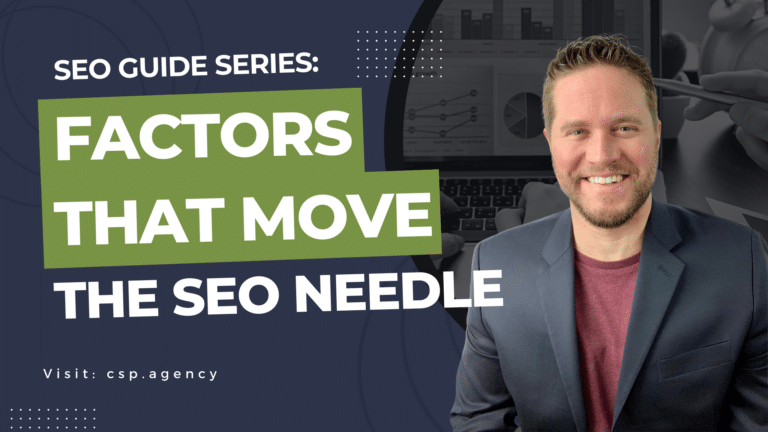The Most Important SEO Factors You Need to Focus On
SEO can feel like a maze of technical jargon and endless to-do lists. But the truth is, not all SEO factors are created equal. Some elements have a much bigger impact on your rankings and overall success than others. So, instead of getting overwhelmed by every little detail, let’s cut through the noise and focus on what really matters.
In this post, we’ll break down the key SEO factors that you need to prioritize. We’ll cover everything from on-page SEO to user experience, and yes, we’ll even take a moment to decode some of that SEO lingo along the way (because who doesn’t love a good keyword joke?).
1. On-Page SEO: The Basics You Can’t Ignore
Let’s start with the bread and butter of SEO: on-page optimization. This is the stuff that happens directly on your website—things like keywords, meta tags, and content structure. If your website were a cake, on-page SEO would be the ingredients. You can’t bake a good cake with bad ingredients, right?
Keywords: Here’s that word again—keywords! Think of keywords as the secret sauce of your content. They’re the terms people type into search engines when they’re looking for something. But here’s the catch: it’s not about stuffing your content with as many keywords as possible (unless you’re aiming for the title of “World’s Worst Website”). It’s about using the right keywords in the right places, naturally and strategically. Sprinkle them like a gourmet chef would season a dish—just enough to enhance the flavor without overwhelming the taste.
Meta Tags: These are the snippets of text that describe a page’s content. The
y don’t appear on the page itself but in the code of your site, helping search engines understand what your content is about. Think of meta tags as the elevator pitch for your page—they need to be concise, compelling, and include your main keyword.
Content Structure: A well-structured page isn’t just easier to read; it’s also easier for search engines to crawl and index. Use headings (H1, H2, etc.), bullet points, and short paragraphs to make your content more digestible. It’s like serving up your information in bite-sized, easy-to-digest pieces—both your readers and search engines will thank you.
2. Technical SEO: The Engine Under the Hood
You can have the most beautiful car in the world, but if the engine doesn’t work, you’re not going anywhere. Technical SEO is that engine—it’s what keeps your site running smoothly and ensures that search engines can crawl, index, and rank your pages.
Site Speed: A fast website isn’t just nice to have; it’s a must. Slow-loading pages can frustrate users and send them running to your competitors. Plus, search engines like Google take page speed into account when ranking sites. So, make sure your website is optimized for speed. Think of it as tuning up your engine to keep it running at top performance.
Mobile-Friendliness: More and more people are browsing the web on their phones, so your site needs to look and perform just as well on mobile as it does on desktop. If your site isn’t mobile-friendly, you’re missing out on a huge chunk of potential traffic. Imagine trying to navigate a website with tiny buttons and endless scrolling on your phone—no thanks, right? Don’t let that be your site.
Crawlability: This one sounds a bit like something out of a sci-fi movie, but it’s actually pretty straightforward. Crawlability refers to how easily search engines can read and index your site’s content. If your site has broken links, duplicate content, or confusing navigation, it’s like throwing a bunch of roadblocks in front of a search engine’s car. Keep your site clean, organized, and easy to navigate.
3. Backlinks: The SEO Currency
In the world of SEO, backlinks are like gold. They’re links from other websites that point to your site, and they’re a major factor in how search engines determine your site’s authority and relevance. Think of backlinks as votes of confidence from other sites. The more high-quality votes you get, the more search engines trust your content.
But here’s the kicker—not all backlinks are created equal. Quality matters more than quantity. A link from a reputable, relevant site is worth far more than a bunch of links from low-quality sites. So, focus on earning backlinks from sites that are respected in your industry. It’s like being endorsed by an industry leader versus a random person on the street. One clearly carries more weight.
4. User Experience (UX): Keeping Your Audience Happy
At the end of the day, SEO isn’t just about pleasing search engines; it’s about creating a great experience for your users. User experience (UX) is all about making sure visitors to your site have a positive experience. This includes everything from how easy your site is to navigate to how quickly they can find the information they’re looking for.
Navigation: Your site’s navigation should be intuitive and easy to use. If visitors can’t find what they’re looking for quickly, they’re likely to bounce (and that’s not good for SEO). Imagine walking into a store and not being able to find the checkout counter. You’d probably leave, right? The same goes for your website.
Content Quality: High-quality content is king, plain and simple. It’s what keeps people on your site and coming back for more. Make sure your content is relevant, informative, and engaging. And don’t forget to keep it fresh—regularly update your content to reflect the latest information and trends.
Call-to-Actions (CTAs): CTAs are the signposts that guide your visitors towards taking the next step, whether that’s signing up for a newsletter, downloading a resource, or making a purchase. Make sure your CTAs are clear, compelling, and easy to find. Don’t leave your visitors guessing what to do next.
Action Steps: Prioritize Your SEO Efforts
- Conduct an On-Page SEO Review: Go through your website and make sure your keywords, meta tags, and content structure are all in top shape. If you’re not sure where to start, don’t worry—we’re here to help.
- Optimize for Speed and Mobile: Check your site’s loading speed and mobile-friendliness. Tools like Google’s PageSpeed Insights can give you a quick snapshot of how your site is performing and where you can make improvements.
- Build High-Quality Backlinks: Focus on earning backlinks from reputable sites in your industry. This could involve guest blogging, creating shareable content, or even reaching out directly to industry influencers.
- Enhance User Experience: Take a walk in your visitors’ shoes. Is your site easy to navigate? Is your content engaging and up-to-date? Are your CTAs clear? Make any necessary adjustments to improve the overall user experience.
- Get an SEO and Site Audit: If you want to see the bigger picture, consider getting a comprehensive SEO and site audit. It’ll give you insights into where you stand and what steps you need to take to improve.
Conclusion
SEO might seem like a tangled web of technical terms and best practices, but when you break it down, it’s all about making your website the best it can be for both users and search engines. By focusing on these key factors—on-page SEO, technical SEO, backlinks, and user experience—you’re setting your site up for long-term success. Remember, SEO isn’t just a one-time effort; it’s an ongoing process. But with the right strategy, you can build a strong foundation that supports your entire marketing plan. Ready to get started? Let’s chat about how we can help you take your SEO to the next level.


